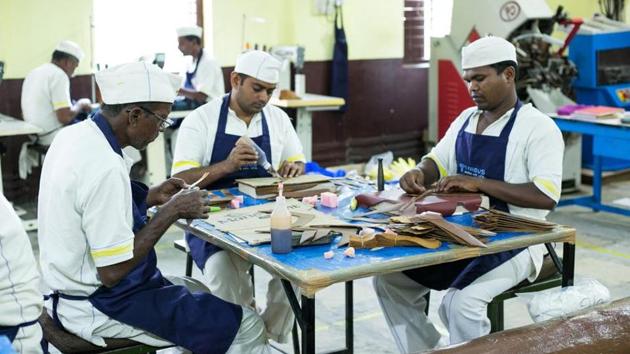Plastic ban brings bagful of joy for jail inmates in Maharashtra
With the demand for cloth bags on the rise, more convicts will be trained and employed; currently, around 2,200 convicts of the total 10,000 make 17,000 paper, cloth bags in state.
The state government banned single-use plastic items in April to protect the environment. But what it did not foresee at the time was if the ban would prove beneficial for convicts too. How? The post-ban demand for cloth and paper bags means inmates who were unemployed will be trained by private players to meet the demand.

Currently, around 2,200 convicts of the total 10,000 make nearly 17,000 paper and cloth bags in the state. Swati Sathe, deputy inspector general (prisons), said they have started training more inmates in Thane, Taloja and Yerawada central prisons, and later expand to other jails.
“Each convict makes seven to eight paper bags daily, which will be increased to 10 to 12,” said BK Upadhyay, additional director general of police (ADGP), prisons. This translates into about 7,20,000 bags a month.
“Many NGOs have approached us, and we are negotiating (prices),” said Upadhyay.
Divej Mehta, director of Tergus Works Pvt Ltd, has approached Pune’s Yerawada Jail because it has a textile machine. Mehta said he has proposed to provide raw material and also train about 30-40 inmates. The new initiative, Mehta said, would begin in Yerwada and gradually extend to other prisons in Nashik, Kolhapur and Mumbai. The idea is to be able to produce 60,000 to 80,000 bags in a month, he added.
BEYOND THE BAN
Apart from cloth bags, convicts supply spare parts to market leader Mahindra and Mahindra’s tractors and two-wheelers, and produce high-quality leather footwear for major brands.
The paradigm shift in this sector, called prison industry, was achieved after the state home department allowed private companies to sources products from prisons. Non-governmental organisations (NGOs) are also facilitated the transition.
Now the prison industry’s diverse portfolio includes furniture, confectionary, imitation jewellery, textile, handloom clothes, etc. Besides, the revenues of prison industry increased almost 14 times, to Rs27 crore in 2017-18 from Rs2 crore in 2007-08. Products manufactured in Maharashtra’s prisons are sold under the brand of “Maharashtra Karagriha”.
The prison industry in Maharashtra is the largest in the country and is primarily situated across eleven districts — Yerawada open jail in Pune, Nagpur, Nashik, Thane, Kolhapur, Sholapur, Amravati, Dhule, Satara and Sangli. The 2,200 convicts work nine hours daily.
Female convicts mostly make paper jewellery incense sticks, candles and zari-work, and do zari and stitching work.
Convicts are also contributing to large-scale industries, including Mahindra and Mahindra, Kolhapur’s iron foundry and leading footwear companies in India.
“Mahindra and Mahindra has outsourced its spare parts business to Yerwada prison,” said Swati Sathe, deput inspector general (DIG-prisons)
But what is attracting these big companies to prisons? Price and quality. Compared to outside labour, prison labour is cheap and the products’ rejection rate is 0%, said officials. However, this was not achieved overnight.
“The companies train convicts to achieve a better quality,” said a prison officer. The private companies provide raw material and pick up the finished goods on their convenience.
Paithani sarees made in the Kolhapur jail are the most sought during exhibitions.
BK Upadhyay, additional DG (prisons) said Yeravada central jail houses the largest and the most profitable factory in the country. The bakery in Thane jail sold 1,606.5kg of cake earning Rs2,53,024 last Christmas.
“The bakery makes 120-130 kg of bread daily which is sent to the Thane mental hospital for patients and staff,” said VB Vayachal, superintendent of police (Thane jail). During a 10-day Diwali exhibition last year, we raked in Rs1 lakh daily by selling sarees, bedsheets, pillow covers, jewellery and baked products.
“Most of the convicts are first-time offenders. They are given work just to keep them busy. It also increases their chances to get jobs,” added Upadhyay.
Stay updated with all the Breaking News and Latest News from Mumbai. Click here for comprehensive coverage of top Cities including Bengaluru, Delhi, Hyderabad, and more across India along with Stay informed on the latest happenings in World News.
Stay updated with all the Breaking News and Latest News from Mumbai. Click here for comprehensive coverage of top Cities including Bengaluru, Delhi, Hyderabad, and more across India along with Stay informed on the latest happenings in World News.






